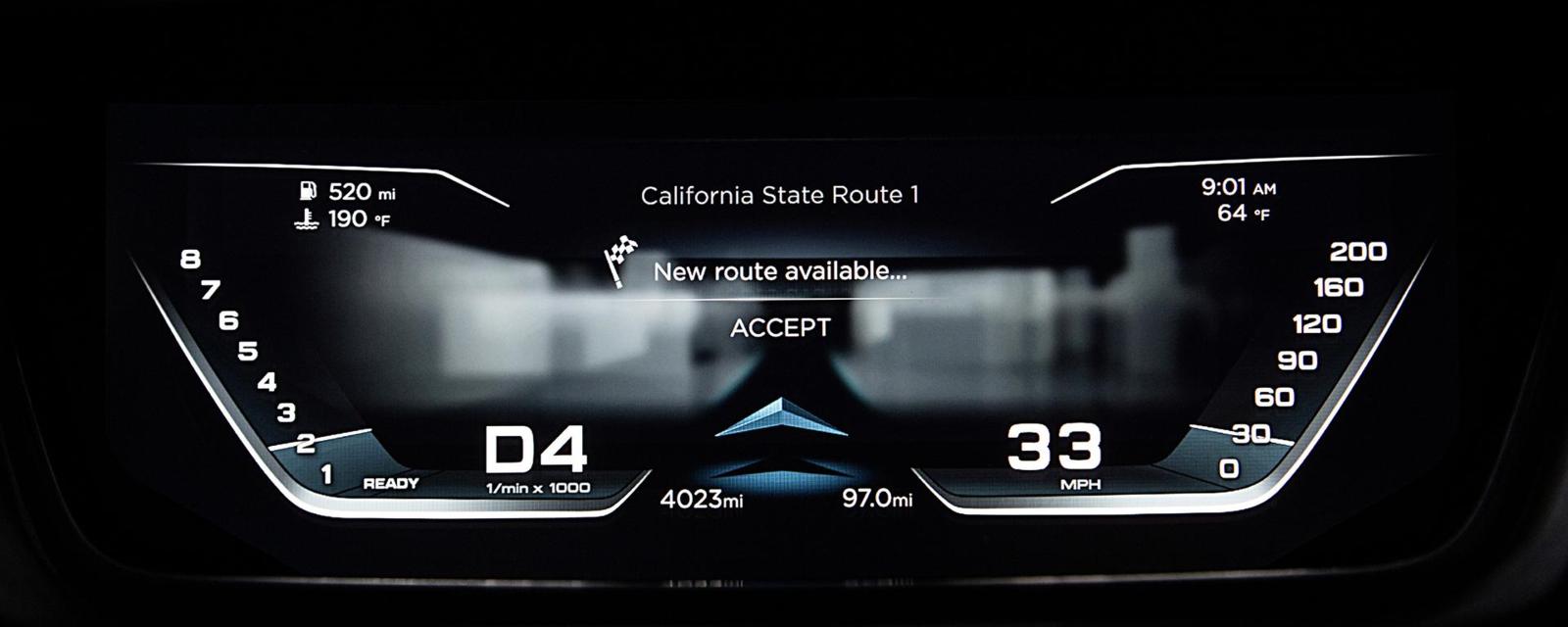THE TECH AND AUTO INDUSTRIES are more interconnected than ever before. And as Jack Rix writes for Top Gear, a new line of Audi vehicles shows how carmakers are embracing new technologies to make car design as minimalist as possible, and your drive as smooth as possible.
Next year will see the release of Audi's artificially intelligent A8, A7, A6, and Q8. They're expected to take design and functionality cues from the Audi Prologue, pictured here. Rix writes that "together they will usher in a new era of more adventurous exterior design, sleek buttonless interiors and autonomous capability." Luxury often breeds innovation, and Audi isn't the only luxury company that's actively installing fancy new tech, like smartphone compatibility and AI-powered parallel parking, to revolutionise driving.
Luxury carmaker Rolls-Royce's 103EX, a combo of space age and art deco, is a 5.9-metre long, otherworldly spectacle — but incorporates many of the sci-fi trends that are beginning to mark the auto industry across the board, from self-driving powers to swapping petrol enginges for luggage storage space.
While Audi's upcoming line is much more realistic and much less Jetsons than the 103EX, it's just one of many high-end car companies to bring far-out technologies into reality, fundamentally changing the on-the-road experience. Here's a look at some of the technologies Audi has in store.
Smartphone compatibility
Who needs car keys? With the upcoming A8, you can use an app on your iPhone to lock and unlock your car — no more fishing for constantly vanishing keychains in your purse or cramming jagged keys in your pockets. What's more? You'll be able to drive into a car park, get out of your Audi, and use your iPhone to parallel park your ride remotely, like it was a big, expensive RC toy.
Haptic touchscreens
Rix describes next year's A8 as something that will storm onto the scene as "a technological tour de force: the first outing for Audi’s new interior design philosophy with the bare minimum of buttons and two haptic feedback touchscreen displays taking centre stage."
Touchscreens have already been appearing in cars, but haptic ones — ones that buzz, vibrate, or beep as you poke them or run your finger across them — is the next innovation. At the Consumer Electronics Show in Las Vegas in January, German electronics manufacturer Bosch showed off a haptic touchscreen with big menus that issue vibrations as your finger taps through them. Why should touchscreens be haptic? Simple: While touchscreens are slick, they still take your eyes off the road. Feeling your way through radio stations and temperature controls keeps you less distracted.
Fewer knobs and buttons
But let's take that one step further and eliminate all buttons completely, whether they're big plastic ones or flat digital ones. While the new Audis will feature those haptic touchscreens, they'll also cut the amount of buttons and knobs on the dash, streamlining the driving experience and making it more minimalistic.
In fact, many carmakers are turning to completely hands-free interfaces, like voice commands, a la digital assistants like Apple's Siri. Ford is looking to integrate Alexa, Amazon's version of Siri, into vehicles where the driver can tell Alexa to interact with internet-connected devices at your home. So while you're on the road, you can open the garage doors, or switch on the porch lights before you even pull into the driveway by simply talking to your car.
Meanwhile, BMW ditches dashboard knobs for gesture controls. A camera in the interior roof scans the car for gestures you're making to input commands. For example, you can accept a hands-free incoming phone call with a wag of your index finger, or decline it with a swipe of your hand.
Autonomous driving
Even the humans themselves aren't required to be 100% present in the driving experience of the 21st Century. While robotic, self-driving cars aren't without their share of controversy: the recent deaths in Tesla's self-driving cars, while not fully attributed to the cars themselves, do little for the emerging technology's reputation. But Audi, like a litany of other car companies that includes BMW, Mercedes, Toyota, and more, wants to grant its new vehicles some level of autonomy.
"The A8 will also blow raspberries in the Tesla’s general direction with a 'level 3 piloted system,' an autonomous function to you and I," Rix writes, "that can take total control of the car up to 60kph in jams (without the requirement for lane markers), with the potential for over-the-air upgrades in future should legislation let driverless speeds increase."
(BBC)



www.ann.az
Follow us !











